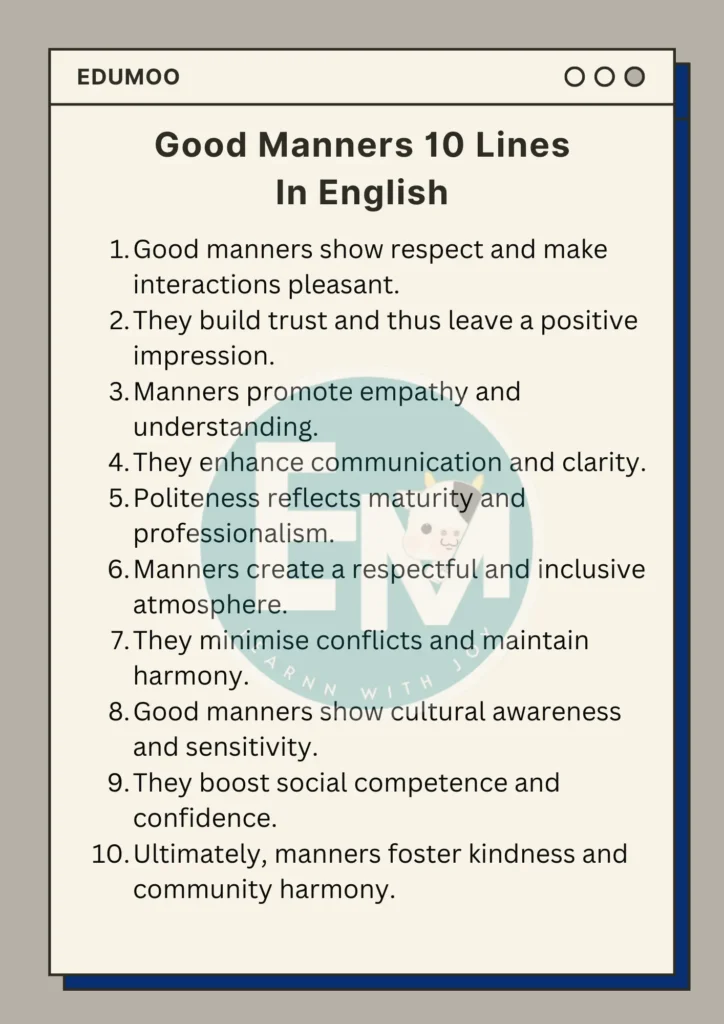Good manners are like a universal language of respect and consideration. They encompass behaviours that promote kindness, politeness, and empathy in our interactions with others. From simple gestures like saying “please” and “thank you” to more complex etiquette in social settings, good manners reflect our values and upbringing. This article explores ten essential manners that enhance relationships and contribute to a harmonious society. By understanding and practising these principles, we can foster positive interactions and create a more respectful and inclusive community. Join us in discovering how these small gestures can make a big difference in our daily lives!
Good Manners 10 Lines In English
- Good manners show respect and make interactions pleasant.
- They build trust and thus leave a positive impression.
- Manners promote empathy and understanding.
- They enhance communication and clarity.
- Politeness reflects maturity and professionalism.
- Manners create a respectful and inclusive atmosphere.
- They minimise conflicts and maintain harmony.
- Good manners show cultural awareness and sensitivity.
- They boost social competence and confidence.
- Ultimately, manners foster kindness and community harmony.

Essay On Good Manners 10 Lines In English In 300 Words
Good manners are more than just a set of rules; they are the cornerstone of respectful and harmonious interactions in society. These behaviours reflect our consideration for others and contribute to creating a positive atmosphere in any environment.
One of the fundamental aspects of good manners is politeness. Simple gestures like saying “please” when requesting something and “thank you” when receiving help or a gift show appreciation and respect for others’ efforts. These small words can make a significant difference in how others perceive us and how we build relationships.
Additionally, good manners include being punctual and respectful of others’ time. Arriving on time for appointments, meetings, or social gatherings demonstrates reliability and consideration for others’ schedules. It shows that we value their time as much as our own.
Furthermore, good manners involve being courteous in our communication and behaviour. This includes listening attentively when others speak, using appropriate language, and avoiding interrupting or dominating conversations. Such behaviours create an environment where everyone feels heard and valued.
Moreover, practising good manners extends to social etiquette, such as greeting people warmly, introducing oneself properly, and observing dining etiquette. These practices ensure smooth and comfortable social interactions, whether in formal settings or casual gatherings.
In conclusion, good manners play a crucial role in fostering positive relationships and creating a respectful community. By practising politeness, punctuality, courtesy, and social etiquette, we contribute to a harmonious society where everyone feels valued and respected. These small acts of consideration and respect can make a significant impact on our personal and professional lives, enhancing our interactions and overall well-being. Let us continue to uphold the principles of good manners to build a more empathetic and inclusive world.
| Also Read: Good Habits 10 Lines In English |
Essay On Good Manners 10 Lines In English In 700 Words
Good manners are important in our daily lives. They help us show respect to others and make the world a nicer place. Let’s explore what good manners are, why they matter, and how we can practise them every day.
Good manners are ways of behaving that are polite and considerate. They show that we respect other people’s feelings and rights. Saying “please” and “thank you” are the best and simple ways to show good manners. When we ask for something, saying “please” makes the request polite. When we receive something, saying “thank you” shows our gratitude. These simple words make interactions pleasant and show that we appreciate others.
Saying “excuse me” is another example of good manners. If we need to interrupt someone or get past them, saying “excuse me” is polite. It shows that we value their space and time. It’s a small phrase, but it can make a big difference in how people feel about us.
Listening when others speak is also very important. Good manners include paying attention when someone is talking to us. This shows that we care about what they have to say. It makes the speaker feel valued and respected. Not interrupting is part of this. Waiting for our turn to speak shows patience and respect. Interrupting can be rude and make others feel unimportant.
Using good table manners is another way to show respect. Eating politely, like chewing with our mouths closed and not talking with food in our mouths, shows respect for those around us. It makes mealtime pleasant for everyone. Saying “please” when asking for food and “thank you” when receiving it also shows good manners at the table.
Good manners are important because they help us live together peacefully. When we are polite and considerate, we create a positive atmosphere. People are more likely to be kind and helpful when they feel respected. Good manners can help us make friends and build strong relationships. They make social interactions smoother and more enjoyable.
Practising good manners can also make us feel good about ourselves. When we know we are treating others well, it boosts our self-esteem. It feels good to know that we are making a positive difference in someone’s day. Good manners can also lead to success in life. People with good manners are often seen as more trustworthy and likeable. This can help us in school, at work, and in social situations.
We can practise good manners every day in many ways. At home, we can show good manners to our family members. Saying “please” and “thank you” to our parents and siblings shows that we appreciate them. Helping with chores without being asked shows respect and responsibility. At school, we can show good manners to our teachers and classmates. Listening when the teacher is speaking, raising our hands before talking, and being polite to our classmates are all ways to show good manners.
In public, we can show good manners by being considerate of others. Holding the door open for someone, saying “excuse me” when passing by, and waiting our turn in line are all examples of good manners. When we use good manners, we make the world a better place for everyone.
Good manners are also important online. When we communicate on the internet, we should be polite and respectful, just like in real life. This means not saying mean things, being kind, and respecting others’ opinions. Good manners online help make the internet a safer and nicer place.
In conclusion, good manners are important for many reasons. They help us show respect to others, create a positive atmosphere, and make social interactions smoother. Practising good manners can make us feel good about ourselves and help us succeed in life. By using good manners every day, we can make the world a nicer place for everyone. So let’s remember to say “please” and “thank you,” listen when others speak, and be considerate of those around us. Good manners make a big difference!
Conclusion
Good manners are essential for creating a respectful and pleasant society. Today, we discussed good manners 10 lines , a quick summary and two essays, one of 300 words and another of 700 words. Good manners, such as saying “please” and “thank you,” listening to others, and being considerate, help us build strong relationships and make the world a better place. Practising these behaviours daily can lead to personal success and happiness. Remember, good manners are key to a harmonious life. Have a great day!

